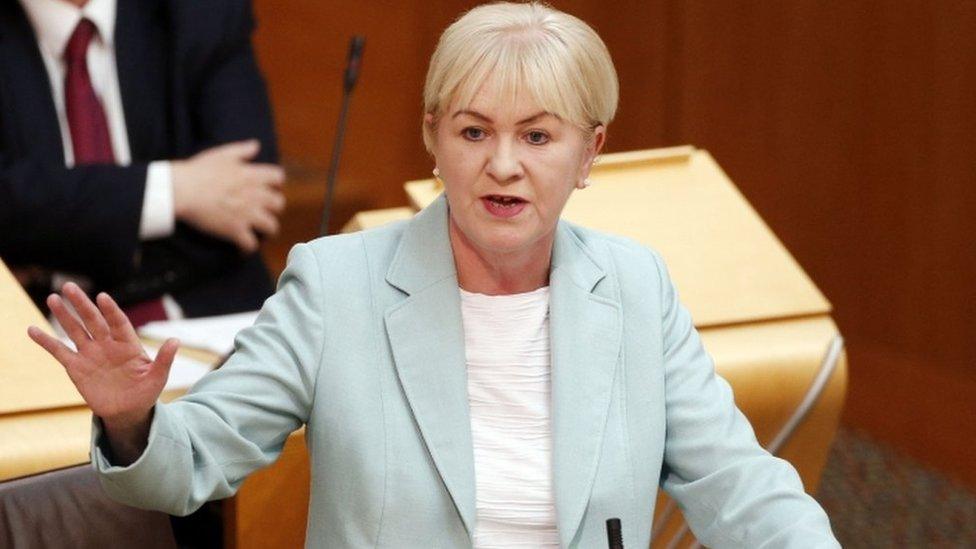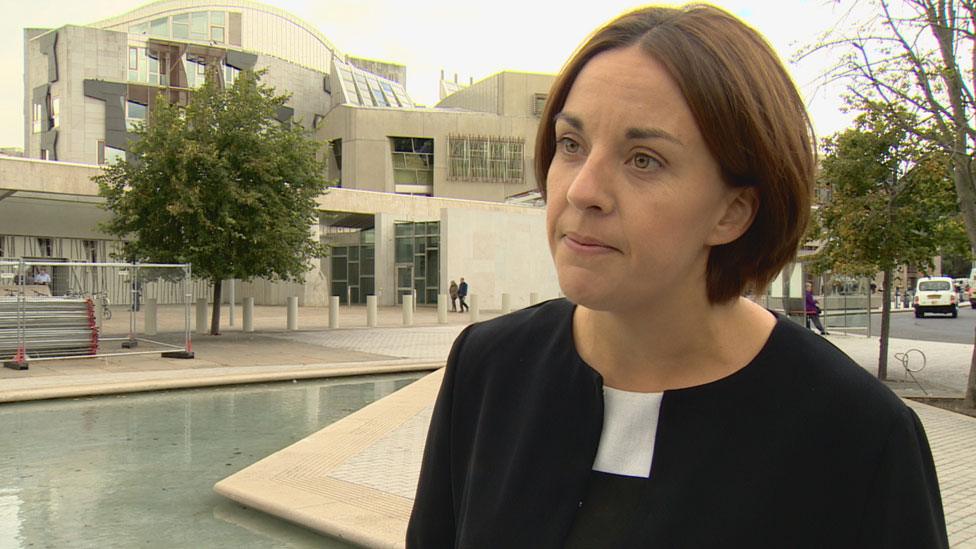Labour seeks to dispel the Lamont lament
- Published

Remember Johann Lamont? Silly question; of course you do. She remains, after all, a prominent member of the Scottish Parliament. A committee convener, no less, and one who, I am told, now displays her innate wit and drollery on a particular social medium.
Start again, Brian. Do you remember Johann Lamont complaining that the party she led, the Scottish Labour Party, was treated "like a branch office" by comrades in London?
I certainly do. And I also remember the conversation with a senior Labour figure who told me: "Brian, we're not treated like a branch office. We are a branch office."
But, of course, you remember all this. It was, at the time two years ago, a defining condemnation of Labour's relationship with Scotland - only faintly reduced in force by the fact that it was delivered by Ms Lamont on demitting office, when a little vitriol is perhaps to be expected.
That comment has hovered over Scottish Labour since, a decidedly unwelcome Banquo - although one cannot stretch that metaphor too far, not least because the recent leitmotif of Labour in Scotland has been famine rather than feast.
Now, finally, Scottish Labour is seeking to dispel the Lamont lament. To push it away. To diminish its lingering force.
More precisely, the UK party as a whole is enacting a plan for greater Scottish autonomy - after a prolonged period of consultation and consideration.
In October last year, Labour's leaders, Jeremy Corbyn and Kezia Dugdale, agreed the outlines of internal party devolution. Now it has been endorsed by the UK party's National Executive Committee (NEC) and should be carried by the pending UK party conference in Liverpool.
Broadly, it gives the Scottish party control over Westminster candidate selection, constituency party organisation and policy, both devolved and reserved.
'Enhanced devolution'
Ms Dugdale has voiced delight. Whaur's yer branch office noo, as she so nearly said. Further, she told me it entrenched the position of the Scottish leader as heading an autonomous, distinct Scottish party. She was, she said, the boss of the party in Scotland, taking orders from nobody south of the border.
However, there are limits. This is, deliberately and explicitly, enhanced devolution rather than independence.
Indeed, the extent of continued co-operation across the border is stressed and vaunted by the party. Kezia Dugdale told me that the party in Scotland remained firmly part of "the Labour family" and was fully committed, for example, to working flat out for the return of a UK Labour Government at Westminster.
So the limits? Firstly, funding remains as is. Consider primarily the cash from affiliates - that is, mostly, trades unions. Generally, their cash goes to the UK party - with an impact across the UK, including in Scotland.
But, when Holyrood elections are pending, there are donations to the party in Scotland. In addition, individual unions support individual candidates who are affiliated to their cause.
It has been decided that there will be no attempt to unpick this. Which, of itself, involves a substantial degree of cross-border co-operation. Again, vaunted by Scottish Labour, without caveat.
Then there is policy. Ms Dugdale says the new approach entrenches policy autonomy for the Scottish party. Over devolved and reserved issues. They can debate what they like, consider what they like - and adopt relevant policy positions.

Jeremy Corbyn has urged Labour members to show "respect" to the party's Scottish leader Kezia Dugdale
Except these policy positions, as endorsed by the Scottish party, will not necessarily feature in the manifesto advanced by Labour at a UK General Election.
Such a manifesto is, inevitably, a digest of policy positions as set out in the party programme, determined by Clause 5 of Labour's rule book. This will still be the case, even after Scottish party autonomy.
So, in the new set-up, Scottish Labour will participate in the Clause 5 meeting which decides the party's policy programme, presumably advocating positions agreed by the Scottish party.
Where there is a difference between the Scottish position and that adopted, say, by the UK conference, then there will be discussion and debate. A reconciliation process designed to lead to a common position.
At a UK General Election, Scottish Labour candidates will stand upon the same platform as candidates elsewhere in the UK. Again, consider context. Labour is seeking UK power, on an agreed UK policy platform. It cannot, credibly, offer voters a pick and mix.
But, I asked Kezia Dugdale, what if the Scottish party wants to scrap Trident - and the UK party does not? There would be, said Ms Dugdale, a reconciliation process with regard to any issue where there was a range of positions.
'Internal insurrection'
The difference, she said, was that the Scottish party would have a distinct, autonomous position - and would be able to argue for that within the counsels of the wider party. Devo Max, remember.
And that "Labour family"? Somewhat strained, of late. Less The Broons. More Kane and Abel. Alongside ratifying Scottish autonomy, the Liverpool conference may be a mite - just a tad - preoccupied by the declaration of its leadership contest.
It seems fairly certain that Jeremy Corbyn will win out, over Owen Smith. What then? Will the internal insurrection against Mr Corbyn, driven mostly by MPs, subside? Perhaps, for a period at least, if and when he wins a further democratic contest.
And what will the newly autonomous Kezia Dugdale do? She backed Owen Smith, suggesting that Mr Corbyn lacked the broad appeal to win power for Labour.
Will she continue with that tone? I would reckon not. Such comments, appropriate to a leadership contest, have to be shelved when the outcome is declared. Expect an acceptance of the outcome and an appeal for unity.
Reconciliation, Clause 5 style. For now.
- Published21 September 2016
